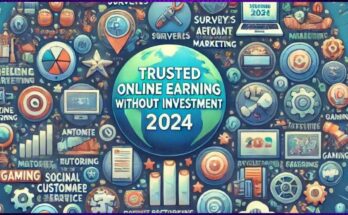Here, we will discuss about The Most In-Demand Freelance Skills In 2024.
Table Of Contents:
| Table Of Contents: |
| Introduction |
| The Most In-Demand Freelance Skills in 2024 |
| Conclusion |
Introduction:
Freelance work has in recent times morphed into a main career choice from what was once thought of as a niche employment. Freelancers do not work on staff like traditional employees but instead operate on their own and take up assignments from different clients without any long-term commitment to them. It is the kind of arrangement that allows for working at desired hours, location, and type of projects that one is experienced in or interested in.
In such a dynamic freelancing environment, the need to be up-to-date with marketable skills cannot be over-emphasized. Skills demanded evolve together with industries and also change as technology advances. Therefore, freelancers must keep retraining themselves to remain competitive within new trends for they risk becoming irrelevant and earning less money.
By 2024, the freelance landscape will have been transformed by technological advancements, shifting work preferences, and global occurrences. The COVID-19 pandemic has accelerated fully remote work environments equipped with virtual collaboration tools as opposed to being an exception. Consequently, the gig economy expands and offers opportunities in various fields spanning creative services through technical expertise. Furthermore, artificial intelligence (AI) and automation have changed job descriptions leading to increased demand for highly specialized skills required in emerging areas.
The Most In-Demand Freelance Skills In 2024:

1. Digital Marketing:
● Sub-skills: SEO, SEM, Social Media Marketing:
SEO (Search Engine Optimization): Improving content quality & websites’ popularity so that they can rank higher on search engines which results in organic traffic
SEM (Search Engine Marketing): Paid advertisements are used to expand reach on Google’s search engine
Social Media Marketing: Creating strategies that engage the audience while increasing web traffic through social media channels.
● Demand Drivers and Market Trends:
Increased Online Presence: As online activities continue expanding businesses are heavily relying on digital marketing.
Data-Driven Strategies: Analytical skills are now more important than ever due its usage by marketers.
Personalized Marketing: To customize marketing strategies towards personal preferences as well as behaviors; data analysis capability along with customer segmentation knowledge plays a major role here.
● Significance in the Twenty-First Century and Beyond:
Reach and Accessibility: Digital marketing has lower costs compared to those associated with traditional means of marketing and can reach a global audience.
Measurable Results: It is all about seeing the immediate effects of online marketing on the performances of campaigns that have been running.
Competitive Advantage: This growth-oriented approach allows firms to achieve a competitive advantage in their respective industries by effectively utilizing digital marketing strategies.
2. Data Analysis and Interpretation:
● Statistical Analysis:
Descriptive Statistics: Numbers that summarize data.
Inferential Statistics: Making conclusions and predictions based on samples.
Regression Analysis: This is an examination of the relationship between variables with future prediction in mind.
● Data Visualization:
Graphs and Charts: These are illustrations that help us understand and analyze information visually
Dashboards: Interactive visual displays used to interpret key performance indicators (KPIs) and track trends concerning data
Machine Learning Algorithms: These use algorithms to analyze data, identify patterns, and make predictions
● Predictive Modeling:
Forecasting: Predicting future trends based on historical patterns
Natural Language Processing (NLP): Understanding human languages such as chatbots and sentiment analysis through analyzing it.
Deep Learning: Neural networks applying complex data analysis for decision making.
3. Programming and Software Development:
● Hot Programming (Python, JavaScript e.t.c):
Python: Versatility and simplicity are the hallmarks of this programming language which has remained one of the most sought-after in the industry. Users can use it to develop websites, analyze data, create artificial intelligent systems, and even machine learning algorithms.
JavaScript: JavaScript is a mandatory tool for any web developer as it can be used to add interactivity to websites. React.js and Node.js frameworks also come in handy in enhancing its usage either at front or back-end development.
● Web Development against Mobile App Development:
Web Development: Web designing skills remain important due to the necessity of online presence. Freelancers good in HTML, CSS, and JavaScript libraries can create user-friendly sites that adapt to the various needs of different users.
Mobile App Development: The fact that mobile phones have now become an essential part of human existence implies that mobile app creation is still viable. Those who know Swift (for iOS) as well as Kotlin/Java (for Android) languages will be able to build fascinating apps addressing customer needs that enhance brand loyalty.
● Specialized Skills (Blockchain, AI Development):
Blockchain: Blockchain technology is on the rise hence increasing demand for decentralized applications developers with skills in DApps creation and smart contracts composition. Mastery of Solidity as a language along with the Ethereum framework increases chances.
AI Development: Artificial intelligence has been transforming sectors from healthcare to finance; hence freelancers knowledgeable about machine learning algorithms, neural networks, etc., should not stop without developing smart solutions oriented towards task automation through data-driven decision processes.
4. Content Creation and Copywriting:
● SEO-Friendly Writing:
Keyword Optimization: Skilled freelancers blend meaningful keywords into their writing to improve visibility or ranking within search engines like Google, Yahoo, and Bing among others that enable them to get found easily by clients seeking such services thus hiring them when needed.
Content Structure: SEO practices aimed at optimizing content for ease of reading by users and search engine crawling are key to enhancing search rankings.
● Content Marketing Strategy:
Audience Research: Content marketing that works depends on the freelancer’s ability to craft messages in line with customer preferences, interests, etc.
Distribution Channels: Knowledge of these platforms allows freelancers to use channels such as social media email marketing or guest blogging to increase their reach hence targeting more people while maximizing the effect of whatever they post online.
● Creative Writing vs. Technical Writing:
Creative Writing: Creative writing is a skill that can help freelancers engage readers with great storytelling, evocative language, and vivid imagery. This is especially useful for entertainment or inspirational content.
Technical Writing: However, technical writing requires being very clear and concise as well as being accurate when one needs to convey difficult information or instructions. Hence a technical writer should be able to create user manuals, technical guides, or any kind of documentation on software products/services.
5. Cybersecurity:

● Detecting and Preventing Threats:
Vulnerability Analysis: For system, network, and application vulnerability identification, cyber security experts perform comprehensive assessments using specific tools as well as techniques in detecting possible weaknesses.
Intrusion Detection Systems (IDS): In real-time, IDS software watches for suspicious network activities and informs the security team about potential threats or attacks. As a result, intrusion prevention systems (IPS) may also actively block or mitigate identified threats.
Firewalls and Endpoint Security: Unauthorized access as well as malware infections are prevented by implementing firewalls and endpoint security solutions. Apart from this antivirus programs point encryption among other measures enhance overall cybersecurity posture.
● Network Security:
Safe Network Architecture: Safe network architecture design including segmentation, encryption, and access controls prevents unauthorized access to data.
Secure Configuration Management: Cybersecurity professionals employ least privilege access, strong authentication, and regular security updates among other best practices when configuring network devices and infrastructure so that to mitigate risks.
Network Monitoring and Incident Response: Monitoring the traffic flow on the network along with its systems is important as it ensures the detection of unusual activities to counter them early enough. Rapid incident response plus mitigation plans help minimize the impact of security incidents hence preventing data loss or system compromise
● Data Protection and Privacy Compliance:
Securing Data Using Encryption Algorithms: Encrypting sensitive data both at rest and in transit helps prevent unauthorized access leading to breaches. This is attained through the application of cryptographic algorithms such as AES, RSA, etc which guarantees confidentiality plus integrity of information processed.
Privacy Regulations Compliance: When it comes to consumer privacy rights protection compliance with data protection regulations like GDPR (General Data Protection Regulation), CCPA (California Consumer Privacy Act), etc., is an essential requirement. They make sure that all the procedures related to handling personal information are carried out according to rules prescribed by regulators together with industry stakeholders.
6. E-commerce and Drop-shipping:
● Online Store Setup & Management:
Platform Selection: The appropriate e-commerce platform like Shopify, WooCommerce, Magento, etc. is selected by considering the factors of business requirements scalability and customization.
Website Design and Development: Companies create visually appealing online stores with user-friendly navigations that work well on mobile phones as well as secure checkouts.
Content Management: In conclusion, this task entails making sure that all information concerning goods and services available for sale is presented accurately to consumers by managing product listings, descriptions, images, pricing as well as inventory levels.
● Product Sourcing and Fulfillment:
Supplier Research and Negotiation: It also involves finding reliable suppliers who will make the most competitive offers in terms of pricing while taking into account other conditions. Also, it assures that a product will be always available for a customer due to cooperation with the particular supplier.
Inventory Management: By doing so it means keeping notice of optimal stock level demand prediction along together with implementing an efficient inventory management system which may prevent understock or overstock situations thereby minimizing cost.
Order Fulfillment: Effective order processing makes sure that customers get what they want at the required time.
● Digital Marketing for E-commerce:
Search Engine Optimization (SEO): Optimizing your online store content including product pages so that search engines may rank them higher than other websites through improved visibility leading to more organic traffic.
Social Media Marketing: These include sites like Facebook, Instagram, and Pinterest where you can find not only potential buyers but also interact with them on different matters related to consumption hence directing them towards your virtual store.
Email Marketing: Consequently, businesses engage in targeted email campaigns aimed at nurturing consumer loyalty through the issuance of newsletters containing promotional offers that motivate repeat purchases.
7. Graphic Design and Multimedia:
● UI/UX Design:
User Interface (UI) Design: UI designers focus on creating visually appealing and user-friendly interfaces for digital products and websites. They ensure intuitive navigation and seamless interaction through elements like buttons, menus, and icons.
User Experience (UX) Design: UX designers prioritize the overall user experience by conducting research, creating wireframes and prototypes, and optimizing usability and accessibility to result in a more satisfying experience for users. They aim to enhance user satisfaction all through the product journey.
● Animation and Video Editing:
Animation: Animators bring static designs to life through motion graphics, character animation, as well as special effects among others. Their work adds interactivity, storytelling as well as visual appeal to websites, mobile apps, or marketing materials that they are designing.
Video Editing: The video editor takes the raw footage of whatever transpired during the shooting phase before editing it into a coherent video that conveys its intended message effectively. The process will involve cutting some parts out of your clips, trimming them down to size or even arranging them in a manner that makes sense, adding effects such as transitions between various clips among others.
● Branding and Visual Identity:
Branding: Branding is about developing a consistent identity that captures what the company stands for. This may include logos as well as brand guidelines among other things which helps ensure that everybody knows where all aspects associated with corporate image are going.
Visual Identity: Visual designers carry branding elements over into assets such as business cards, packaging material, or even letterheads by making sure that they maintain visual coherence while designing for different media platforms or contexts.
8. Project Management:

● Agile Methodology:
Iterative Approach: Agile project management is about flexibility and responsiveness to change, achieved by dividing projects into smaller manageable iterations or sprints. This iterative approach enables teams to adapt to changing requirements while still delivering value incrementally.
Collaborative Environment: Collaboration is an integral part of any agile project management. The team members should be able to communicate and work together to reach their goals.
● Remote Team Coordination:
Communication Tools: Communication tools such as video conferencing, instant messaging, and collaboration platforms are used by project managers for facilitating remote team interactions. Clear communication channels are critical for the clarification of tasks, resolving issues, and maintaining team unity.
Workflow Optimization: This way remote working dynamics necessitate the need for efficient project managers who can optimize workflows in this era of freelancing work.
● Client relations and understanding the expectations of the customers:
Stakeholder Engagement: Stakeholders determine how successful one’s projects have been over time and must be involved. On that note; a well-meaning project manager must ensure everything is going on well by liaising with clients throughout all stages stipulated within your agreement.
Conflict Resolution: Projects cannot run smoothly without conflicts since they usually arise during projects. Project managers should resolve these issues quickly using conflict resolution strategies that build relationships with clients while keeping the momentum of projects always moving ahead in all ways possible.
Conclusion:
In this article, we took a look at some of the most demanded freelance skills required to excel in 2024 changing landscape. Freelancers who specialize in such areas as digital marketing, programming, project management, or cybersecurity will easily meet customers’ demands and those set by industries.
The freelancer market keeps changing due to advancements in technology, consumer behavior patterns, and emerging market forces that have always impacted it. Thus, businesses operate differently today through rising remote employment, and gig economy platforms among other new technologies as opposed to yesteryears. In such unstable conditions, freelancers have to be quick in responding to various new challenges that may come their way hence the need for innovation since old ways do not open up new doors.
Freelancers should understand that adaptation is needed; they must continuously learn even though it does not just come naturally but rather it is an acquired characteristic required by them so long as they want to remain relevant with time across freelancing marketplaces which change from year to year. The market tells freelancers they must stay ahead of emerging trends, gain more knowledge, and acquire additional skills if they want to stay competitive.
Final Thoughts:
By making professional inquiries so far and networking with colleagues, one can raise their bargaining power thereby allowing them access to information about other hidden opportunities that would have otherwise remained out of moral scrutiny before finally deciding on what direction should take regarding their professional development.
To sum up, embracing change and investing in oneself as well as innovating will open up many possibilities for freelance workers now. One must therefore learn relevant skills and remain flexible enough to adapt to a changing environment which would enable one to make choices that are not only limited to today alone but also ensure sustainable success tomorrow.
That is the end of our article about The Most In-Demand Freelance Skills In 2024.



